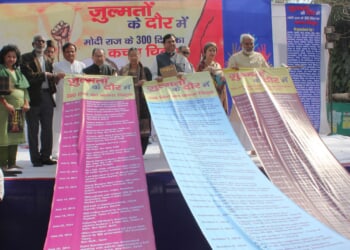ACI Africa, Apr 4, 2025 /
06:00 am
A priest in Nigeria’s Diocese of Auchi who was abducted alongside a seminarian on Trinity Sunday 2020 recently spoke about his harrowing experience as an abductee, attributing his successful escape to Our Lady of Perpetual Help.
In an interview with ACI Africa, CNA’s news partner in Africa, on March 29 following three days of peaceful protest against kidnappings and killings in the Auchi Diocese, Father Isaac Agabi, 46, a parish priest, recounted his ordeal and recommended that major seminaries in Nigeria consider teaching seminarians survival tactics as well as crisis management.
Agabi said he and a seminarian with whom he was traveling, Justice Chidi Mbonu (who is now a priest), were abducted on June 7, 2020, when they were ambushed by Fulani herdsmen while traveling along a road in Edo state.
“I saw a group of boys running towards my car. At first, I didn’t realize they were armed, but when I noticed the guns, I knew we were in trouble,” Agabi said.
“They forced the car open, dragged me out, and immediately started beating me. They raised me up and threw me to the ground. They used wood to hit me repeatedly. Within a minute, they had turned me into rubbish.”
As the kidnappers assaulted him, Agabi pleaded with them, asking what he had done to deserve such treatment.
“They told me I was their enemy. They accused me and others of killing their people. They said they would kill me,” Agabi recalled.
Both he and Mbonu were led into the forest, where their captors continued to brutalize them.
Agabi recalled being stripped of his alb, stole, and everything else he had on him except his rosary. In captivity, the kidnappers demanded a ransom of 100 million naira (approximately $65,000).
“They asked who I would call, and I told them I could contact the bishop. The kidnappers spoke to him, but the bishop told them the Church had no money to pay,” the priest recalled, adding that Bishop Gabriel Ghiakhomo Dunia “angered the kidnappers, who intensified their assaults.”
Agabi realized that their survival depended on giving the abductors some hope that ransom negotiations were ongoing.
“I begged the bishop and other priests whom I contacted to at least pretend to negotiate with them. I knew they were capable of killing us at any time, and we needed to buy time,” Agabi told ACI Africa.
As days passed, the captors’ brutality continued. “They would tie us up, cover our faces, and threaten to kill us. They took us to a deep pit, saying they would dump our bodies there after killing us.”
Then Agabi recalled an unexpected turn of events that he said gave them a chance to escape. One night, two of the abductors went out to buy food, but they never returned. This created confusion among the other kidnappers.
“I am a devotee of Our Mother of Perpetual Help; I made a [prayer] to Mother of Perpetual Help… all through my case with those kidnappers, I was always invoking the salvation of Mother of Perpetual Help,” he said.
“That Sunday was Trinity Sunday,” Agabi recalled, referring to the day they were abducted and further recalling his surrender to the will of God, either execution or surviving to tell the story. He said he remembers praying, “God, if it’s your will that I survive, make it happen, but if not, let your will be done; I surrender my life into your hands, Lord.”
(Story continues below)
Subscribe to our daily newsletter
“At around midnight, some of the [herdsmen] started falling asleep. That was our opportunity. The seminarian and I ran into the bush and kept running. We ran for hours in total darkness, not knowing where we were going,” Agabi recalled.
The escape was successful and on June 9, 2020, both Agabi and Mbonu finally regained their freedom.
The priest described the escape as a miracle, adding that the experience was traumatic, leaving him with scars. Almost five years since his captivity, Agabi continues to struggle with the psychological effects of the ordeal.
“Ever since then, I have not been the same. If I see a Fulani man or if I drive on a lonely road, fear grips me. I don’t think anyone who has experienced this can be normal again,” he said.
While the experience of fear is real, the abduction experience has strengthened his resolve. “I’m no longer scared of anything; I’m not afraid of death,” Agabi said.
“Even though you say you want to kill me now and you point a gun at me, I will not follow you; I will not go,” he said, adding that if he had known he would be subjected to the torture he experienced, “it’s better you die than you experience that.”
Agabi lamented the lack of psychospiritual support, saying: “Nobody has ever called me to ask how I am coping or if I need help. I am just trying to live with the trauma.”
In his view, the Church and security agencies must do more to protect priests, who are increasingly becoming targets. “The kidnappings are not stopping. A priest was even taken from his own apartment. This means we are not safe anywhere,” he said.
He went on to call for better education and training on security awareness, saying: “We need to be taught how to respond when faced with these situations. What should we do when attackers storm our homes? How do we escape? How do we protect ourselves?”
Agabi, who has been a priest for 15 years, has proposed organizing spiritual retreats where the clergy are trained in crisis management, self-defense, and survival tactics.
“We don’t pray for bad things to happen, but if they do, we must know what to do to defend ourselves as priests,” he said.
Agabi urged other priests facing similar threats not to lose faith.
“Do not give up. Look up to God, the same God who saved me. If we are alive after such experiences, it means God still has a purpose for us,” he said.
“Those men had every opportunity to kill me, but God did not allow it. That means my mission is not yet completed here on earth, and this is a second chance for me to serve God even better than I had done before I was kidnapped,” Agabi said.
This story was first published by ACI Africa, CNA’s news partner in Africa, and has been adapted by CNA.


















